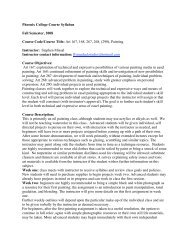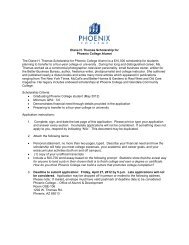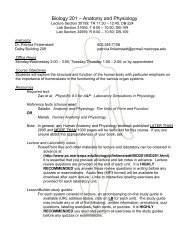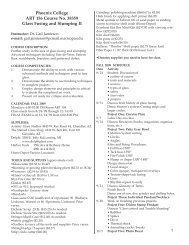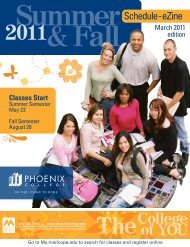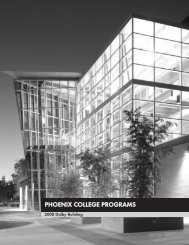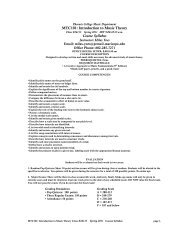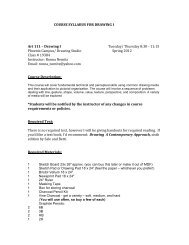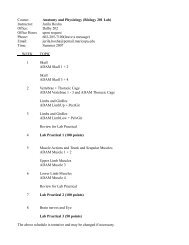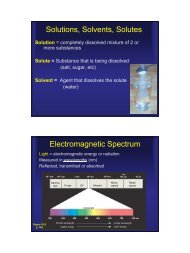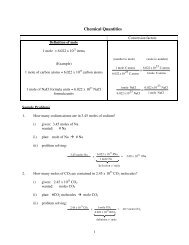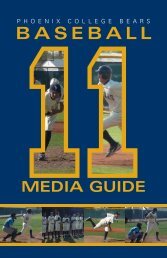Phoenix College Catalog 2009-10
Phoenix College Catalog 2009-10
Phoenix College Catalog 2009-10
You also want an ePaper? Increase the reach of your titles
YUMPU automatically turns print PDFs into web optimized ePapers that Google loves.
<strong>Phoenix</strong> <strong>College</strong> <strong>2009</strong>–20<strong>10</strong> CATALOG | 43<br />
2.<br />
to the equivalent of twelve (12) credit hours of retraining for no<br />
additional tuition.<br />
Because technical occupations change rapidly, initial employment<br />
in an AAS Degree-related field must occur within one year of<br />
graduation from the AAS Degree program in question.<br />
Retraining needs to occur as cost effectively as possible. The<br />
graduate's employer must present a list of the graduate's skill<br />
deficiencies to the appropriate vice president or designee at the<br />
graduate's alma mater. All retraining will be completed in a reasonable<br />
time as agreed to by the employer, the student, and the college.<br />
LICENSURE DISCLAIMER<br />
Maricopa Community <strong>College</strong>s courses and programs prepare<br />
students for entry into a variety of professions. Many of these<br />
professions require that a person hold an occupational license or<br />
certificate in order to work in a particular field. Typically, a person<br />
must meet certain legal requirements before obtaining such a license<br />
or certificate. These requirements are established by county, state or<br />
federal agencies, and often are based on a person’s character, or<br />
whether the person has been convicted of a criminal offense. It is<br />
possible for a student who has obtained a degree or certificate from<br />
a community college to be denied the right to work in a particular<br />
profession after completing the degree or certificate because of<br />
concerns over the student’s character or criminal background. Any<br />
student preparing to enter a field for which a professional license or<br />
certificate is required is strongly advised to consult with the<br />
appropriate government agency that issues such credentials. That<br />
agency can provide the student complete information about any<br />
requirements the law imposes for working in a particular<br />
occupation.<br />
MCCCD GENERAL EDUCATION STATEMENT<br />
The general education core of the program of study for an associate<br />
degree or a certificate helps students develop a greater understanding<br />
of themselves, of their relationship with others, and of the richly<br />
diverse world in which they live. The general education experience<br />
provides students with opportunities to explore broad areas of<br />
commonly held knowledge and prepares them to contribute to<br />
society through personal, social, and professional interactions with<br />
others. General education fosters students' personal development by<br />
opening them to new directions, perspectives, and processes.<br />
Through its general education requirements, the Maricopa County<br />
Community <strong>College</strong> District is committed to helping students<br />
develop qualities and skills that will serve them throughout their lives.<br />
General education opportunities encourage students to:<br />
• Build self-awareness, self-respect, and self- confidence<br />
• Recognize and respect the beliefs, traditions, abilities, and<br />
customs of all people and all cultures<br />
• Consider the local, global, and environmental impacts of<br />
personal, professional, and social decisions and actions<br />
• Access, evaluate, analyze, synthesize, and use information<br />
wisely<br />
• Communicate effectively personally, socially, and<br />
professionally<br />
• Think critically, make informed decisions, solve problems,<br />
and implement decisions<br />
• Consider the ethical implications of their choices<br />
• Value the learning process throughout their lives<br />
• Integrate and connect ideas and events in a historical<br />
perspective, and see relationships among the past, the<br />
present, and the future<br />
• Develop a personal sense of aesthetics<br />
• Use technological resources appropriately and<br />
productively<br />
• Work cooperatively and respectfully with others to serve<br />
their communities<br />
The general education experience at MCCCD is composed of specific<br />
elements across the curriculum designed to provide the learner with<br />
essential knowledge and skills:<br />
• Communication<br />
• Arts and Humanities<br />
• Numeracy<br />
• Scientific Inquiry in the Natural and Social Sciences<br />
• Information Literacy<br />
• Problem-Solving and Critical Thinking<br />
• Cultural Diversity<br />
GENERAL EDUCATION DESIGNATIONS<br />
(example: [FYC], [SB], [HU], etc.)<br />
Effective Fall 2000 the course evaluation and/or general education<br />
designation as listed in the Arizona CEG (Course Equivalency Guide)<br />
within the Arizona Course Applicability System (AZCAS) is valid for<br />
the term in which the student is awarded credit on the transcript. A<br />
course evaluation and/or general education designation may be<br />
subject to change. Given that curriculum is dynamic at both MCCCD<br />
and the institutions to which MCCCD students transfer, students<br />
have the option to petition for general education evaluations and/or<br />
general education designations.<br />
The college reserves the right to make necessary course and<br />
program changes in order to meet current educational standards.<br />
Transcripts For Transfer (AR 2.3.<strong>10</strong>)<br />
The transcript is issued upon written request only. Those students<br />
who want to transfer to other institutions of higher education,<br />
including other Maricopa Community <strong>College</strong>s, must request their<br />
transcripts be sent from the Admissions and Records Office/Office<br />
of Student Enrollment Services. However, transcripts may be shared<br />
within the Maricopa Community <strong>College</strong> District without the written<br />
request of the student in compliance with FERPA.<br />
Official transcripts will not be issued to students having outstanding<br />
debts to any of the Maricopa Community <strong>College</strong>s. The release of<br />
transcripts is governed by the guidance of the Family Education<br />
Rights and Privacy Act of 1974 (see Records Policy in the Student<br />
Rights and Responsibilities section). There is no charge for unofficial<br />
transcripts, or for official transcripts sent between Maricopa<br />
Community <strong>College</strong>s. See the Tuition and Fees Schedule for charges<br />
for other official transcripts.<br />
Academic Misconduct (AR 2.3.11)<br />
A.<br />
Definitions<br />
1. Academic Misconduct - includes misconduct associated<br />
with the classroom, laboratory or clinical learning process.<br />
Examples of academic misconduct include, but are not<br />
limited to, cheating, plagiarism, excessive absences, use of<br />
abusive or profane language, and disruptive and/or<br />
threatening behavior.<br />
2. Cheating - includes, but is not limited to, (a) use of any<br />
unauthorized assistance in taking quizzes, tests, assessment<br />
tests or examinations; (b) dependence upon the aid of<br />
sources beyond those authorized by the faculty member in<br />
writing papers, preparing reports, solving problems, or<br />
carrying out other assignments; or (c) the acquisition,<br />
without permission, of tests or other academic material<br />
belonging to a member of the college faculty or staff.<br />
3. Plagiarism - includes, but is not limited to, the use of<br />
paraphrase or direct quotation of the published or<br />
unpublished work of another person without full and clear<br />
acknowledgment. It also includes the unacknowledged<br />
use of materials prepared by another person or agency<br />
engaged in the selling of term papers or other academic<br />
materials. Information gathered from the internet and not<br />
properly identified is also considered plagiarism.<br />
MCCCD Common Policies



